MAS GUSTO PA RIN COAL? Coal power plants suspension frowned upon
- August 28, 2019
- 0

“The Philippines intends to undertake greenhouse gas carbon emission reduction of about 70 percent by 2030 relative to the business as usual scenario,” Rep. Rufus Rodriguez of Cagayan de Oro City 2nd district was quoted in a Manila Bulletin report.
“May we know whether the Secretary agrees that we should, therefore, in order to comply with our Intended National[ly Determined] Contribution to the UN, we should therefore already have a moratorium on coal plants?” he asked.
The Philippines is one of the countries that promised to the United Nations (UN) to significantly reduce its greenhouse gas (GHG) emissions by 2030.
Cusi argued that coal is still needed for baseload power plants.
“Saying that we should have a moratorium on any technology must be a disservice to our energy security,” he added.
Coal has the majority portion of the country’s power generation mix at 52.1 percent in 2018, which was only 49.6 percent in 2017, according to DOE Undersecretary Jesus Posadas’s presentation to the Appropriations panel.
For a country committed to reducing its greenhouse gas emissions, the Philippines is heavily dependent on coal, which is considered a “dirty” power source.
“Are you, therefore, saying that it’s the policy of the DOE to approve all applications for additional coal plants?” Rodriguez
To which Cusi replied, “the contribution of carbon emissions is not only from coal plants. It’s also from the transportation sector.”
Cusi said that he will approve coal power plant applications depending on the country’s need.
Bayan Muna Party-List Rep. Eufemia Cullamat noted that there currently 16 coal-fired power plants in the Philippines, and two more under construction.
Cusi said the DOE has adopted a technology-neutral policy.
“But I’d like to also clarify…that the Philippines is number one in environmental sustainability. We beat all the countries. Out of 120 countries, we are number one,” he said, referring to a study carried out by London-based World Energy Council.
“Where we are poor is in energy security and energy accessibility. Those ar
e areas that we need to improve [on],” said Cusi
.
Energy generation coming from renewable energy (RE) also decreased from 24.7 percent in 2017 to 23.5 percent in 2018.
“I really wish that it should be increasing because that’s precisely what the law (Renewable Energy Act of 2008) likes to see,” Rodriguez said.